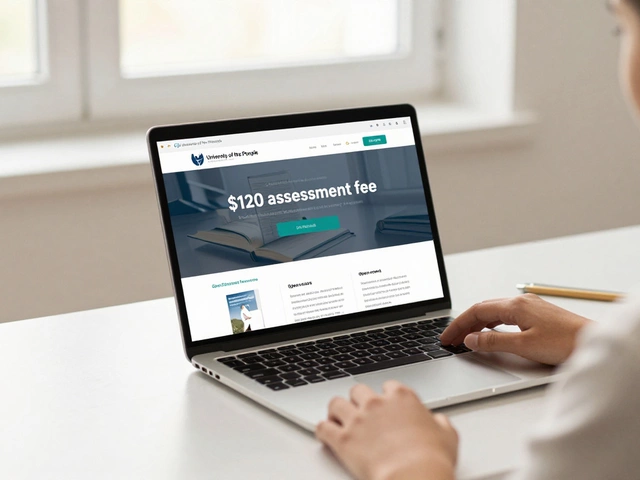Jan
7

- by Dhruv Ainsley
- 0 Comments
Are you drawn to the idea of working for the government, where your daily efforts contribute to the society's greater good? You're not alone. Many aspire to enter the public sector to embark on meaningful and stable career paths. Starting on this journey, however, can sometimes seem a bit daunting given the various pathways and positions available.
Understanding the structure of government roles and how to prepare for them is crucial. With a bit of guidance, you can effectively navigate the requirements, from educational prerequisites to the competitive selection process, including exams and interviews. From gaining relevant experience through internships to harnessing the power of professional networking, there are myriad ways to set yourself apart as a stellar candidate. Let’s delve into what it takes to successfully break into the world of public service.
- Understanding Government Job Roles
- Meeting Educational and Skill Requirements
- Preparing for Government Exams
- Networking and Internships
- Crafting a Resilient Government Job Application
Understanding Government Job Roles
Diving into the realm of government jobs is like stepping into a universe rich with varied and specialized roles. At a glance, these positions can seem incredibly diverse, ranging from policy advisors and financial analysts to social workers and urban planners. Each role is intricately designed to address specific public needs, often aligned with governmental priorities. Therefore, grasping the nature of these roles can guide your preparation and application process.
Public sector employment offers a rich tapestry of opportunities across local, state, and federal levels. For instance, at the federal level, you might engage with agencies that focus on national security, healthcare, or environmental protection. Alternatively, state and local governments often require professionals to manage education systems, infrastructure, and public safety services. With such a broad spectrum, understanding the particular impact and responsibilities of each role is essential to align your interests and skills with your desired career path. An effective strategy is to explore job descriptions on official government platforms, which regularly update their listings and provide a comprehensive look into each position's duties.
Most government jobs have defined responsibilities and performance indicators, meaning each role typically comes with a fixed set of tasks and expectations. This can offer a level of predictability and stability in your career. Yet, what remains consistent is the common thread of values such as integrity, accountability, and a commitment to public service. The daily tasks you undertake will be grounded in these values, creating an environment where personal satisfaction aligns closely with the public impact of your work. Aspiring candidates often find it beneficial to align their long-term career aspirations with these roles by seeking experiences that mirror these values.
According to the US Office of Personnel Management, "Federal jobs exist in nearly every conceivable field, from technology to healthcare, environment to crime prevention." This vastness implies that the public sector encompasses virtually all occupations one might find in the private sector, but each comes with a distinct public service focus.
One strategy to better understand the intricacies of these roles is through informational interviews and discussions with current government employees. Such interactions can reveal the 'behind-the-scenes' aspects of everyday work life that standard job descriptions might not cover. Engaging with alumni networks, attending career fairs, or participating in online forums that focus on government careers can provide valuable insider insights. Developing an understanding of the types of challenges faced in various roles can help you identify positions that not only fit your skill set but also appeal to your personal interests.
Another interesting aspect of government employment is the potential for lateral movement and career growth within the system. Although roles have specific entry-level requirements, many paths offer upward mobility or a shift in focus over time. For instance, starting in an administrative capacity might grant you opportunities to specialize or transition into policymaking or management roles. To navigate these shifts effectively, continued learning and adaptability become key. Many government organizations provide employees with options for further education, skill development programs, and mentorship initiatives.
Meeting Educational and Skill Requirements
Pursuing a career in government jobs often begins with meeting specific educational benchmarks and skill sets. The importance of these prerequisites cannot be overstated; they serve as the foundation for your role and responsibilities within the public sector. While each government position may demand a unique combination of education and skills, some universal standards are applicable across most roles. Typically, at the very least, a bachelor's degree is required for entry-level positions. However, certain technical positions may require more specialized education such as a master’s degree or even a doctorate.
It's essential to identify which area of government service interests you and to tailor your educational path accordingly. Fields like public administration, political science, and law often provide strong backgrounds for those looking to engage deeply in policymaking and administration. Similarly, degrees in finance, economics, and statistics are invaluable for roles in public sector financial management. The choice of degree should align with your chosen career path within the government, as an education directly related to your field of interest can help you stand out in a competitive applicant pool.
Beyond formal education, relevant skills are equally paramount. Skills such as analytical thinking, problem-solving, and effective communication are highly prized in government roles. Government employees frequently engage in complex decision-making and policy analysis, which necessitates these skills. A good grasp of information technology can be advantageous too, as digital fluency is becoming increasingly vital in modern government operations. According to a report by the Partnership for Public Service, "Critical thinking and interpersonal abilities are often more distinguishing than technical skills in high-stakes government roles." Venturing outside traditional educational frameworks, workshops, seminars, and online courses can significantly bolster your skill set without the need for formal advanced degrees.
Moreover, gaining practical experience through internships can complement your educational achievements. Internships are not just about learning on the job but also about expanding your network and establishing professional relationships. Many government agencies offer internships that can sometimes lead to full-time employment. These internships are designed to provide you with a better understanding of government work environments and expectations.
"The ability to adapt and learn new skills is paramount in government roles today, especially as technology changes the landscape of traditional public service," states a career advisor at the U.S. Office of Personnel Management.
To help you assess the educational and skill requirements typical for various government positions, consider the following table that categorizes requirements by job role:
| Position | Minimum Education | Core Skills |
|---|---|---|
| Civil Servant | Bachelor’s Degree | Communication, Analytical |
| Financial Analyst | Bachelor's in Finance/Economics | Numerical Data Analysis |
| IT Specialist | Bachelor's in Computer Science | Technical, Problem-Solving |
| Policy Advisor | Master's in Public Policy | Research, Decision-making |
In conclusion, establishing a firm educational and skill-based foundation is critical to successfully achieving employment in the government sector. As you advance, continue to refine and expand these aptitudes to enhance your career trajectory and remain adaptable to the evolving demands of public service.

Preparing for Government Exams
Embarking on the path to a government job often requires navigating a maze of exams that are designed to assess your suitability for a role in the public service. These exams can vary greatly depending on the position and level of responsibility but share common elements like testing analytical skills, general knowledge, and comprehension. The journey begins with understanding the specific format and requirements of the exam pertinent to your desired role. Some exams are standardized aptitude tests, while others may require specialized knowledge related to specific fields such as law or economics.
Preparing effectively involves a structured plan. First, acquire the right study materials. Many organizations provide official guides, and there are numerous resources available online and at libraries that offer practice tests. It's important to allocate a study schedule that accounts for all the subjects you need to cover. Consistent, focused study sessions over a period work far better than cramming at the last minute. Also, it's essential to identify subjects where you may need more attention and dedicate extra time to those areas.
“The will to win is important, but the will to prepare is vital.” — Joe Paterno
Another vital aspect is taking mock exams under real test conditions. This not only helps in managing time effectively during the actual exam but also aids in understanding the pattern in which questions are posed. The feedback from these mock tests can provide insights into your strengths and weaknesses, allowing you to adjust your study plan accordingly. Many official public sector websites often release prior exams, which can serve as a useful tool in your preparation.
Joining study groups can also enhance your preparation. Engaging with others who are preparing for the same civil service exams encourages the exchange of ideas and resources. Group studies often introduce you to different problem-solving approaches that can be beneficial. It’s also motivational to be part of a group as it can help maintain your focus and dedication. Networking with people who have successfully completed the exams can provide firsthand information and tips that are not covered in study materials.
Lastly, maintaining good physical and mental health during preparation is equally important. It's crucial to manage stress, ensure adequate rest, and maintain a balanced diet during this period. Incorporating short breaks into your study routine can prevent burnout and improve retention. Adopting relaxation techniques like meditation or yoga can also be beneficial. These simple but effective practices ensure that you are in the best state of mind on the exam day, ready to give it your best shot.
Networking and Internships
One of the most effective ways to enter the public sector is through strategic networking and securing relevant internships. These opportunities not only provide you with valuable work experience but also expose you to the inner workings of government operations. It's essential to cultivate relationships with those already in the field, as they can offer invaluable insights and guidance. Networking doesn't just mean attending events; it's about building meaningful connections over time. You can start by reaching out to mentors or colleagues in the field and asking them about their experiences and tips on starting your government career.
Internships are a highly recommended avenue for anyone serious about landing a government job. They offer a chance to work on real projects, interact with professionals, and understand the day-to-day responsibilities involved. Many government agencies offer internship programs specifically designed to train and evaluate potential future employees. When looking for internships, consider programs that align with your career goals and provide a clear path to full-time employment. A well-executed internship can sometimes turn into a permanent position, giving you a jumpstart in your civil service career.
To maximize your networking potential, immerse yourself in professional associations related to your field of interest. Join platforms like LinkedIn to connect with industry professionals, join discussion groups, and share your aspirations and experiences. Attending seminars and workshops can also provide both knowledge and networking opportunities. When you attend such events, take the initiative to introduce yourself to speakers and participants. Boldness in networking often pays off with new contacts and recommendations.
In a study conducted in 2023, it was found that over 70% of professionals in the civil service attributed their job placement to connections made during internships and networking events. So, it's clear that this approach works. Government services often seek employees who have proven themselves reliable and capable within the system. By demonstrating your skills and proactive nature during an internship, you can become a preferred candidate for future openings.
Remember, networking should be a mutual process. Always consider how you can add value to those you connect with by sharing your expertise or assist them in their goals.
"Networking is not about just connecting people. It’s about connecting people with people, people with ideas, and people with opportunities.”Do not hesitate to ask your network for informational interviews. These informal meetings can expand your understanding of government job roles and help you learn the right strategies for your job search.
The human element in networking often opens doors that typical applications can’t—bridging the gap between qualifications and personal touch. So, keep engaging, keep connecting, and always express gratitude to those who share their time and wisdom. As you continue to develop these essential skills, you'll find yourself better equipped to harness the vast opportunities available within the governmental sphere.

Crafting a Resilient Government Job Application
When considering a career in the public sector, crafting a standout government job application is paramount. It's more than just filling out forms and submitting a resume; it requires a strategic approach to showcase why you're the best candidate for government jobs. Firstly, research is your ally. Understand the role you're applying for by carefully reading the job description provided in the posting. Familiarize yourself with the specific competencies and qualifications the ministry, department, or agency values the most. By understanding these, you can tailor your application to address these needs directly.
Your resume, the cornerstone of your application, should mirror the language used in the job description. Many government agencies utilize applicant tracking systems, which means matching keywords can be critical for your application to pass through the initial selection process. Detail your experience in direct response to the outlined requirements. Clearly quantify your achievements with numbers and data to give context to your accomplishments. A well-crafted resume will not only highlight your qualifications but also give insights into your problem-solving abilities and future potential within the public sector.
When it comes to writing a cover letter, think of it as your personal pitch. This is where you breathe life into your resume's bullet points. Instead of repeating what is already listed, use this space to add depth to your professional narrative. Share stories of when you’ve had to demonstrate the skills they require, giving examples of your competency and a glimpse of your dedication to public service. According to a report by the Partnership for Public Service, agencies look for candidates who express not only suitability but passion and a genuine understanding of the public sector’s core mission.
"What truly sets one applicant apart from another isn’t just experience, but the passion and drive to serve the community," said Max Stier, President and CEO of the Partnership for Public Service.
Let's not overlook the power of recommendation letters. If the application demands these, seek out individuals who are familiar with both your work ethic and personal character. In government roles where trust and integrity are pivotal, having someone vouch for your moral and professional suitability can be a compelling endorsement. Sometimes these letters can speak directly to your compatibility more effectively than lists on a resume.
Organization and attention to detail are crucial. Before you hit that submit button, ensure every piece of your application package is flawless. Double-check for typos, ensure your documents adhere to any specified format, and confirm that all required fields are complete. Submitting a polished application shows professionalism and reflects your seriousness about the position.
Finally, always keep track of deadlines. This often overlooked aspect of the application process is vital. Government positions open and close for applications on strict schedules. Missing a deadline can mean missing an opportunity for months or even years. By methodically managing these details, you'll cultivate a resilience in your job application process that ensures your candidacy shines brightly.





